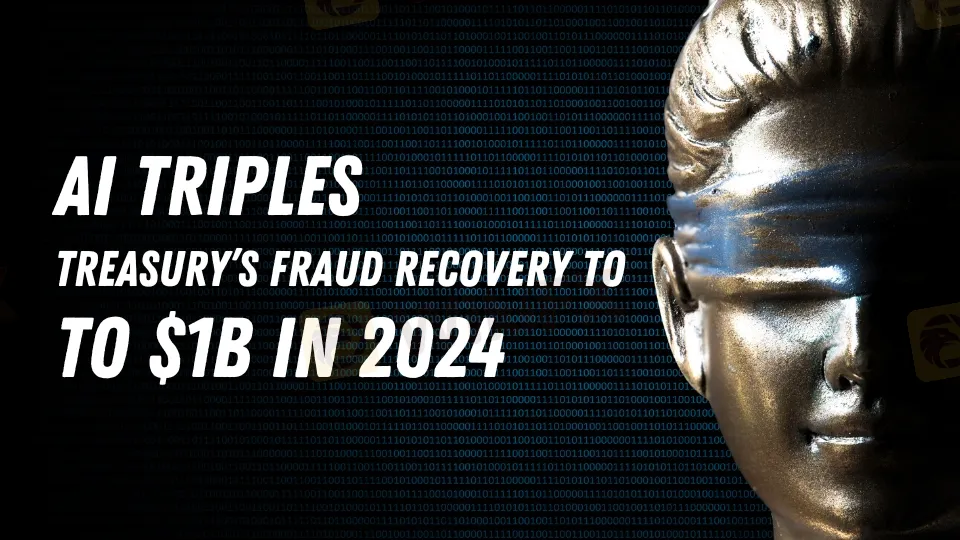简体中文
繁體中文
English
Pусский
日本語
ภาษาไทย
Tiếng Việt
Bahasa Indonesia
Español
हिन्दी
Filippiiniläinen
Français
Deutsch
Português
Türkçe
한국어
العربية
AI Triples U.S. Treasury’s Fraud Recovery to $1B in 2024
Abstract:The U.S. Treasury's use of AI for fraud detection leads to a significant increase in recovery, reaching $1 billion in fiscal 2024, thanks to machine learning.

The U.S. Treasury Department has achieved significant success in combating financial crime by adopting artificial intelligence (AI), recovering an impressive $1 billion in check fraud during fiscal year 2024. This marks a nearly threefold increase compared to the previous year and underscores the transformative role AI plays in fraud detection.
Treasury officials attribute much of this success to machine learning, which enabled the department to detect and prevent over $4 billion in fraud—a sixfold increase from the prior fiscal year. Renata Miskell, a senior Treasury official, emphasized that AI's ability to identify hidden patterns and anomalies in vast datasets has substantially improved the department's fraud detection capabilities.
The Treasury‘s journey into AI began in late 2022, aligning its efforts with the established practices of banks and credit card companies. Unlike generative AI models, which focus on generating text and images, the Treasury's system employs machine learning to analyze data and identify suspicious activity at speeds far beyond human capability. This speed is crucial, given the Treasury’s responsibility for managing an annual payment volume of around $7 trillion, including Social Security payments, tax refunds, and federal payroll.
The rise in fraud, particularly following the COVID-19 pandemic, has highlighted the importance of AI in protecting taxpayer dollars from scams. Despite these advancements, concerns about AIs potential misuse by bad actors have surfaced. Treasury Secretary Janet Yellen and other officials have warned about the risks AI could pose to the financial system.
In response, Miskell assured that human oversight remains a critical part of the process. Every flagged transaction undergoes a thorough review by a human before any determination of fraud is made, ensuring that AI enhances, rather than replaces, human judgment.
As the Treasury expands its AI initiatives, it is working with state agencies to improve fraud detection tools, especially in areas like unemployment insurance fraud. The IRS has also announced plans to use AI to identify tax evasion schemes, reflecting a broader trend among federal agencies to adopt technology for financial oversight.
Final Thoughts
The U.S. Treasurys successful integration of AI in fraud detection demonstrates the power of technology to strengthen financial security while highlighting the need for balanced human oversight. As fraud schemes grow more sophisticated, the continuous evolution of AI tools and practices will be essential to protecting taxpayer funds and maintaining trust in the financial system.

Disclaimer:
The views in this article only represent the author's personal views, and do not constitute investment advice on this platform. This platform does not guarantee the accuracy, completeness and timeliness of the information in the article, and will not be liable for any loss caused by the use of or reliance on the information in the article.
Read more

Kraken Offers $105 Fee Credit for FTX Fund Recipients
Kraken offers $105 in trading fee credits to FTX fund recipients, enabling $50,000 in crypto trading on Kraken Pro with zero fees. Secure your funds today!

Good News Malaysia: Ready for 5% GDP Growth in 2025!
Malaysia's economy is on track to sustain its robust growth, with GDP expected to exceed 5% in 2025, according to key government officials. The nation's economic resilience is being driven by strong foreign investments and targeted government initiatives designed to mitigate global economic risks.

Oriental Kopi’s IPO: Worth the Buzz or Not?
Kopi Holdings Bhd, a café chain operator under the brand Oriental Kopi, is gearing up for its listing on the ACE Market of Bursa Malaysia. The company has garnered a positive valuation from Mercury Securities Sdn Bhd, which has assigned a fair value of 68 sen per share, citing strong earnings growth potential driven by outlet expansions and increasing contributions from fast-moving consumer goods (FMCG) sales.

Tradu Introduces Tax-Efficient Spread Betting for UK Traders
Tradu’s introduction of tax-efficient spread betting and groundbreaking tools like the Spread Tracker signals a new era of accessible, competitive, and innovative trading solutions for UK investors.
WikiFX Broker
Latest News
High-Potential Investments: Top 10 Stocks to Watch in 2025
US Dollar Insights: Key FX Trends You Need to Know
Why Is Nvidia Making Headlines Everywhere Today?
Discover How Your Trading Personality Shapes Success
FINRA Charges UBS $1.1 Million for a Decade of False Trade Confirmations
Bitcoin in 2025: The Opportunities and Challenges Ahead
BI Apprehends Japanese Scam Leader in Manila
Big News! UK 30-Year Bond Yields Soar to 25-Year High!
SQUARED FINANCIAL: Your Friend or Foe?
Join the Event & Level Up Your Forex Journey
Currency Calculator






